

Henry David Thoreau. Un article de Wikipédia, l'encyclopédie libre.
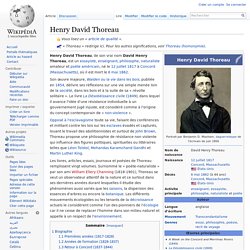
Henry David Thoreau Portrait par Benjamin D. Maxham, daguerréotype de l'écrivain de juin 1856 Œuvres principales Opposé à l'esclavagisme toute sa vie, faisant des conférences et militant contre les lois sur les esclaves évadés et capturés, louant le travail des abolitionnistes et surtout de John Brown, Thoreau propose une philosophie de résistance non violente qui influence des figures politiques, spirituelles ou littéraires telles que Léon Tolstoï, Mohandas Karamchand Gandhi et Martin Luther King.
Biographie[modifier | modifier le code] Premières années (1817-1828)[modifier | modifier le code] Portrait au crayon d'Henry David Thoreau en 1854 par Samuel Worcester Rowse et conservé à la Concord Free Public Library. Slavoj Žižek. "Žižek" and "Zizek" redirect here.
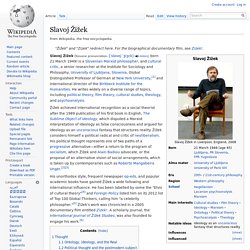
For the biographical documentary film, see Zizek!. Luc Boltanski. Luc Boltanski (born 1940) is a French sociologist, Professor at the École des hautes études en sciences sociales, Paris, and founder of the Groupe de Sociologie Politique et Morale, known as the leading figure in the new "pragmatic" school of French sociology.[1] His work has significantly influenced sociology, political economy and social and economic history.
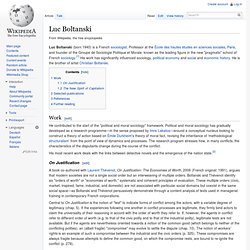
He is the brother of artist Christian Boltanski. Work[edit] He contributed to the start of the "political and moral sociology" framework. Political and moral sociology has gradually developed as a research programme—in the sense proposed by Imre Lakatos—around a conceptual nucleus looking to construct a theory of action based on Émile Durkheim's theory of moral fact, revising the inheritance of ‘methodological structuralism’ from the point of view of dynamics and processes. The research program stresses how, in many conflicts, the characteristics of the disputants change during the course of the conflict. Jacques Ellul. Jacques Ellul (French: [ɛlyl]; January 6, 1912 – May 19, 1994) was a French philosopher, law professor, sociologist, lay theologian, and Christian anarchist.
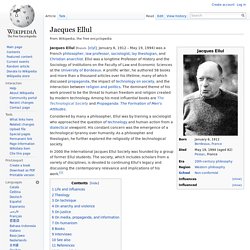
Ellul was a longtime Professor of History and the Sociology of Institutions on the Faculty of Law and Economic Sciences at the University of Bordeaux. A prolific writer, he authored 58 books and more than a thousand articles over his lifetime, many of which discussed propaganda, the impact of technology on society, and the interaction between religion and politics.
The dominant theme of his work proved to be the threat to human freedom and religion created by modern technology. Among his most influential books are The Technological Society and Propaganda: The Formation of Men's Attitudes. Michel Foucault. Born in Poitiers, France to an upper-middle-class family, Foucault was educated at the Lycée Henri-IV and then the École Normale Supérieure, where he developed an interest in philosophy and came under the influence of his tutors Jean Hyppolite and Louis Althusser.
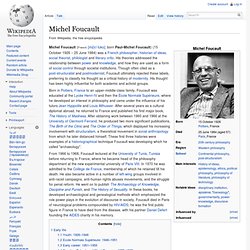
After several years as a cultural diplomat abroad, he returned to France and published his first major book, The History of Madness. Baruch Spinoza. Biography[edit] Family and community origins[edit] Spinoza's ancestors were of Sephardic Jewish descent, and were a part of the community of Portuguese Jews that had settled in the city of Amsterdam in the wake of the Alhambra Decree in Spain (1492) and the Portuguese Inquisition (1536), which had resulted in forced conversions and expulsions from the Iberian peninsula.[11]
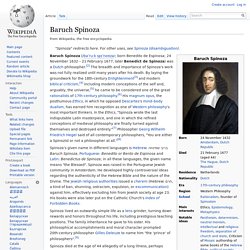
Gilles Deleuze. Gilles Deleuze (French: [ʒil dəløz]; 18 January 1925 – 4 November 1995) was a French philosopher who, from the early 1960s until his death, wrote influentially on philosophy, literature, film, and fine art.

His most popular works were the two volumes of Capitalism and Schizophrenia: Anti-Oedipus (1972) and A Thousand Plateaus (1980), both co-written with Félix Guattari. His metaphysical treatise Difference and Repetition (1968) is considered by many scholars to be his magnum opus.[2] Life[edit] Deleuze was born into a middle-class family in Paris and lived there for most of his life. His initial schooling was undertaken during World War II, during which time he attended the Lycée Carnot. Jacques Rancière. Jacques Rancière (born 1940) is a French philosopher, Professor of Philosophy at European Graduate School in Saas-Fee and Emeritus Professor of Philosophy at the University of Paris (St.
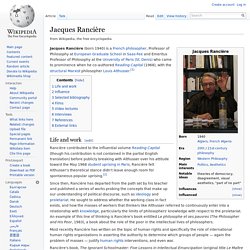
Denis) who came to prominence when he co-authored Reading Capital (1968), with the structural Marxist philosopher Louis Althusser.[1] Life and work[edit] Rancière contributed to the influential volume Reading Capital (though his contribution is not contained in the partial English translation) before publicly breaking with Althusser over his attitude toward the May 1968 student uprising in Paris; Rancière felt Althusser's theoretical stance didn't leave enough room for spontaneous popular uprising.[2] Jacques Rancière : la haine de la démocratie. « Nous avons été habitués à entendre que la démocratie était le pire des gouvernements à l’exception de tous les autres.
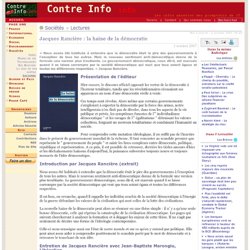
Mais le nouveau sentiment anti-démocratique donne de la formule une version plus troublante. Le gouvernement démocratique, nous dit-il, est mauvais quand il se laisse corrompre par la société démocratique qui veut que tous soient égaux et toutes les différences respectées. » Jacques Rancière. Présentation de l’éditeur Hier encore, le discours officiel opposait les vertus de la démocratie à l’horreur totalitaire, tandis que les révolutionnaires récusaient ses apparences au nom d’une démocratie réelle à venir. Ces temps sont révolus. Pour comprendre cette mutation idéologique, il ne suffit pas de l’inscrire dans le présent du gouvernement mondial de la richesse. Pierre Bourdieu. Pierre Bourdieu (French: [buʁdjø]; 1 August 1930 – 23 January 2002) was a French sociologist, anthropologist,[2] and philosopher.[3] Bourdieu rejected the idea of the intellectual "prophet," or the "total intellectual," as embodied by Jean-Paul Sartre.
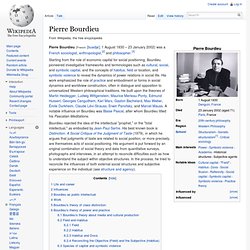
Jean Baudrillard. Noam Chomsky. Un article de Wikipédia, l'encyclopédie libre. Pour les articles homonymes, voir Chomsky. Noam Chomsky[1] né le à Philadelphie, est un linguiste et philosophe américain. Noam Chomsky La Fabrication du Consentement (partie 1) Deleuze/Guattari.